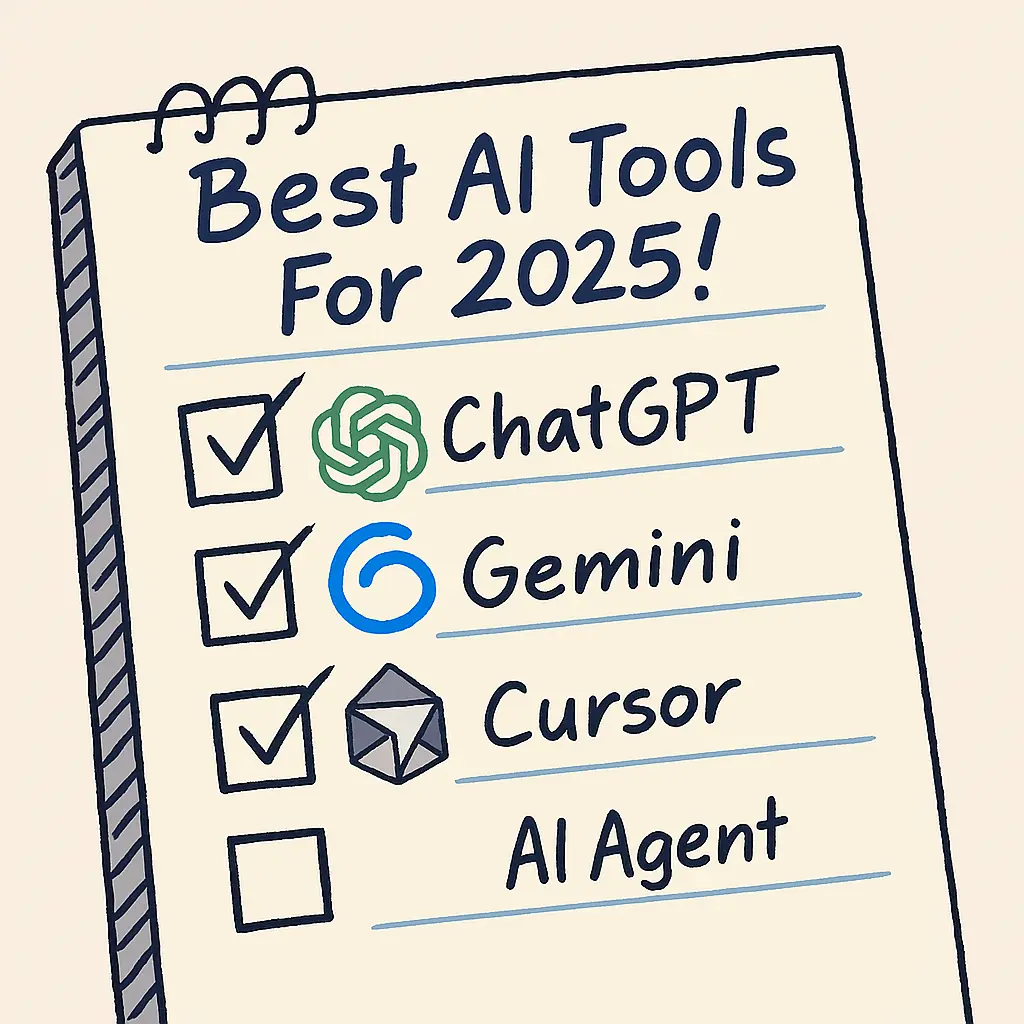AI tools are still in an early phase of development, and there’s no clear winner in the LLM race yet.
While many providers market their models as general-purpose, practice shows that different LLMs perform differently at certain types of tasks.
Here’s my list of the best AI tools (as of September 24, 2025) for specific jobs.
1. Coding
This is where the arms race is most intense.
The most convenient way of using AI is to use it with AI powered IDE (like Cursor) or CLI assistant tool (like Claude Code).
Currently, the most popular choices are:
- Cursor
- Claude Code (CLI)
- Gemini CLI
- OpenAI Codex (CLI)
And in this category, user sentiment shifts quickly. One week people praise Cursor and dismiss Claude Code, the next it’s the opposite.
Personally, I use Cursor because it’s the most versatile option. It provides built-in access to the most popular models, sometimes even offers free trials, and functions as a fully fledged IDE rather than just an automated CLI tool. When I need extra flexibility, I extend it with Claude Code or Codex through API-based pricing.
In my work, I mostly rely on AI-assisted coding, not “vibe coding.” If you prefer the latter, I’d recommend the Codex CLI tool, which currently outperforms both Claude Code and Gemini CLI—especially with the release of gpt-5-codex-high.
But what model to use with Cursor? It’s my current model stack:
- Everyday tasks: gpt-5-codex / claude-4-sonnet / grok-code-fast
- Refactoring: gemini-2.5 (gemini models seem to be the most pedantic and balanced, which works good for refactoring)
- Small code adjustments: whatever is free so as not to waste tokens, currently code-supernova
2. Building MVPs
I’ve separated this from the coding category because the use case is different and requires a distinct tool set.
MVP-building tools are designed to create an entire app or website from a single prompt.
The most popular platforms right now are Lovable, Replit, and Bolt.
I haven’t used those apps a lot, but from my experience, the one on top was Lovable. I would build the same prototype across all three platforms, and each time I preferred the version generated by Lovable.
Beyond these high-end MVP builders, I also want to highlight two smaller tools for more specific use cases:
- DeepSite (built on DeepSeek AI, available as a Huggingface Space): Great for generating decent landing pages as a single HTML file with proper styling. It’s not perfect, but it’s simple, requires no customization, and works out of the box.
- Gemini App Builder (via Google’s AI Studio): Best suited for prototyping apps around image generation and editing.
3. Text-to-Image
Right after coding, image generation is probably the most hyped AI use case. Feels like every week a new model drops.
For me, though, the best results so far come from Google: nano-banana (Gemini 2.5 Flash Image) and Imagen 4.
The most popular one and the default choice now is Nano-banana, which is available for free in Google AI Studio and with Gemini chat app.
The biggest issue with Google’s image models is the super sensitive filter, which is filtering out so many images that won’t violate any laws.
4. AI Assistant
I consider AI assistant as a tool that knows broad context and can help us with decision-making and planning.
Since context is everything here, the easiest way to work is through web chat interfaces. Most of them let you create projects, where you can dump docs, notes, or other files as your knowledge base.
Based on my benchmarks, Grok here is the best one. No matter if I provided long context or no context at all, Grok’s outputs were the best.
5. Writing
When I’m picking an AI writing tool, I mostly care about two things:
- Can it avoid sounding generic?
- Can it actually mimic a specific style?
For me, ChatGPT is the go-to. It’s the best at picking up on my writing style just from past conversations, so I don’t need to keep pasting context every time, which is very convenient.
GPT models alongside Claude models and Grok-4 are all very good at writing like human copywriter.
The best you can do is to paste a few articles you’ve written and ask every LLM to generate a style guide based on it. Then you combine it into a single, unified guide you share with LLM. Test all models you can and pick whatever works best. For me, it’s also GPT-5.
6. Search / Research
Now most AI chat interfaces provide researching mode. Personally, I really like ChatGPT DeepResearch. It has an extremely simple, but helpful feature - it asks few questions before starting research. Because of this, the query is narrowed and outputs can be more adjusted to your needs.
However, daily for searching (instead of googling) and researching I use Perplexity. I got a year plan for free and the outputs are satisfying enough to use it. However, for more complex tasks I run research in both, Perplexity and ChatGPT, and combine results.
7. Learning
For me, the most powerful AI-based learning tool is NotebookLM from Google. It’s free and easy to use.
It allows articles/videos summarization, creating AI enhanced notes on specific topic. You can easily combine external sources with your notes to create awesome knowledge pages.
8. General Usage AI Agents
AI agents for general usage are really hard to do. There are so many use cases to cover and so many options, that even LLMs can suffer from cognitive overload.
It’s best to use suited AI workflow or specialized AI agents for certain tasks instead of general usage AI agents. However, if I were to point one tool that stands out, it’s definitely Manus.
Manus is really great at executing complex tasks with different tools to use. And it can very quickly produce reports, project plans etc. It’s definitely worth trying.
TL;DR
There is no single tool for every use case, and there’s no single AI race winner yet.
If I were to pick only ONE AI service today, I’d go with ChatGPT plan. It’s good at writing, researching and coding with Codex is really promising.
I’d definitely stick to paying monthly instead of yearly, because the market is changing so rapidly that yearly discount may be not worth losing the flexibility.
Kamil Kwapisz

